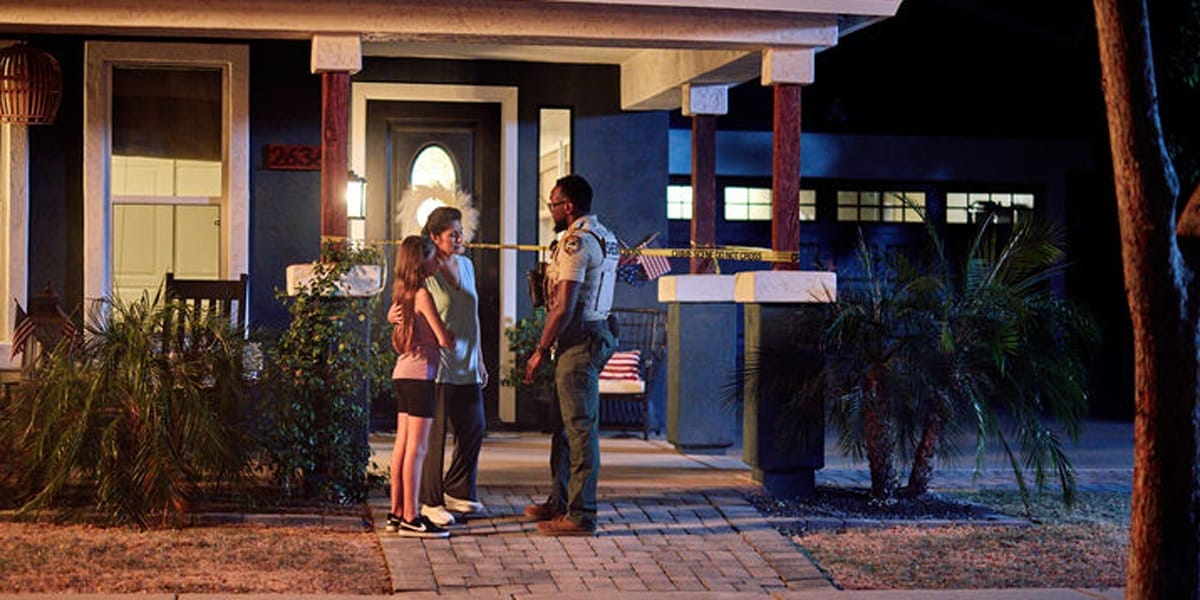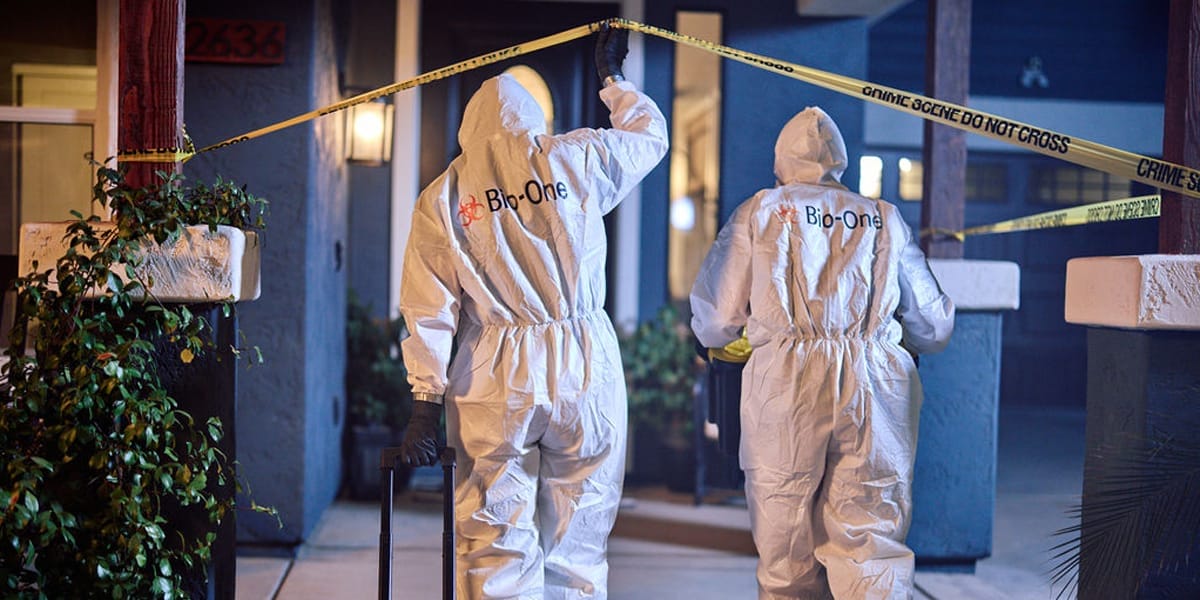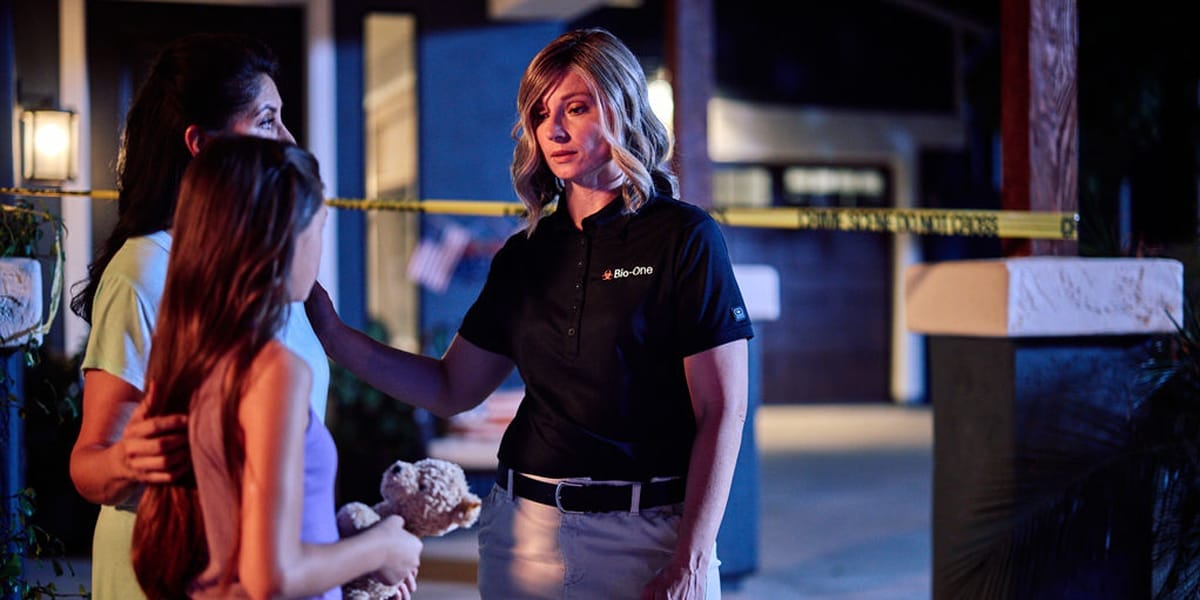More Than Just a Scene
When tragedy strikes, families are left carrying a weight that goes far beyond the incident itself. A crime scene isn’t just about what happened—it’s about what’s left behind. For families, returning to that space can be overwhelming. It’s a reminder of loss, fear, and pain at the very moment when what they need most is comfort and support.
Yet in the middle of grief, families quickly learn something few expect: the responsibility for cleanup doesn’t fall to the police, the city, or investigators. It falls to them.
That realization can be crushing. The good news is, no one has to face this burden alone. Professional crime scene cleanup isn’t just about restoring a property—it’s about helping families take the first step toward healing.

____________________________
When the unthinkable happens, the last thing families should have to worry about is how to clean up the aftermath.
____________________________
The Emotional Toll of a Crime Scene
Every family’s experience is unique, but the emotional impact of encountering a crime scene often follows the same painful threads:
- Shock and Disbelief: The mind struggles to process what just happened.
- Grief and Loss: Whether it’s the death of a loved one or the trauma of violence, grief is immediate and consuming.
- Fear and Anxiety: Worries about safety, security, or even what neighbors might think can heighten stress.
- Retraumatization: Entering or seeing the space again brings back painful images, sounds, and emotions.
For many families, the hardest part is the sense of being alone in this process. They didn’t choose to be in this situation, and yet the responsibility for restoring their home now rests on their shoulders.
____________________________
Did You Know?
Research has shown that when people are repeatedly exposed to trauma reminders in their living environment, symptoms of grief and post-traumatic stress disorder (PTSD) can last longer and become more severe.
____________________________
Who Handles Crime Scene Cleanup?
After investigators finish their work, who is responsible for cleaning a crime scene?
- A. The police department
- B. The city or county government
- C. The property owner or family
Answer: C Most families are surprised—and overwhelmed—to learn that the responsibility for cleanup falls on them.
____________________________
Why Cleanup Is More Than Just Cleaning
It might be tempting to think of crime scene cleanup as just another form of “deep cleaning.” But the truth is, it’s far more than that.
A crime scene carries both emotional weight and physical danger. Stains or remnants aren’t just unpleasant—they are vivid reminders of trauma. Even after hours of scrubbing, families may feel their space has been permanently changed.
Without proper remediation, emotional healing can stall. Families deserve to reclaim their homes without being constantly reminded of what happened there.
Imagine walking into your living room after a traumatic event. The carpets look clean, but you notice faint stains or an odor that lingers. Do you feel comforted—or do you feel the weight of what happened, all over again?
This is why professional restoration matters. It’s not just about appearance—it’s about peace of mind.

The Hidden Hazards Families Don’t See
While the emotional toll of a crime scene is often the most visible, there are also unseen dangers that linger long after the incident. These risks don’t always appear on the surface, which can create a false sense of security if cleanup is attempted without professional assistance.
Bloodborne Pathogens
Blood and bodily fluids may appear as stains, but they can pose serious health risks. Viruses such as HIV, Hepatitis B, and MRSA are known to survive outside the body for hours, days, or even longer, depending on the conditions.
Exposure isn’t limited to direct contact—microscopic droplets or residue on surfaces can also spread disease if touched or aerosolized during cleaning. Without the proper protective equipment and disinfectants, anyone attempting to clean the scene risks infection.
Structural Damage
What families often don’t realize is how quickly fluids can seep into porous materials like wood, carpet, drywall, or subflooring. Even when a surface looks clean, contaminants may have traveled deeper, where bacteria thrive unseen. Over time, this can lead to:
- Mold and bacterial growth
- Softening or warping of floors and walls
- Costly structural repairs if left untreated
In some cases, entire sections of flooring, furniture, or drywall must be removed and replaced to ensure the home is truly safe.
Lingering Odors
Odors are more than an inconvenience—they are a sign that microscopic contaminants are still present. The smell of blood, decomposition, or other biohazards can cling to fabrics, penetrate HVAC systems, and reappear long after the space seems “clean.”
These odors not only retraumatize families but also signal ongoing health risks if the underlying contamination has not been entirely removed.
Why Ordinary Cleaning Isn’t Enough
Standard household cleaners and DIY efforts are insufficient to eliminate these dangers. Specialized tools—such as ozone machines, ATP testing (to verify sanitation), and EPA-registered disinfectants—are required to restore the environment safely.
Professional remediation doesn’t just clean what’s visible; it addresses the hidden layers of contamination to ensure the home is safe, stable, and livable once again.
____________________________
Did You Know?
Biohazard materials can penetrate surfaces like wood and drywall within minutes. Even if a surface appears clean, harmful bacteria may remain hidden, posing ongoing health risks and potentially causing costly property damage if left untreated.
____________________________

How Professional Cleanup Supports Healing
When tragedy strikes, cleanup is never just about sanitizing a space—it’s about helping families start the recovery process. Professional crime scene cleanup goes beyond surface-level cleaning to restore health, safety, and dignity.
Restoring the Environment
Professionals don’t just wipe down visible surfaces. They utilize advanced remediation techniques, including ATP testing to confirm sanitation, medical-grade disinfectants, and specialized equipment that penetrates deep into porous materials where contaminants may hide.
Odor neutralization systems, air filtration, and biohazard disposal protocols ensure the space is genuinely safe and habitable again.
This level of restoration allows families to step back into their homes without fear or hesitation. Instead of seeing reminders of what happened, they see a clean, stable environment where healing can begin.
Respecting Privacy and Dignity
A crime scene isn’t just physically hazardous—it’s also deeply personal. The presence of marked vans, large crews, or public attention can add unnecessary shame or stress to an already painful time.
That’s why professional cleanup companies prioritize discretion. From arriving in unmarked vehicles to working quietly behind closed doors, their goal is to protect the family’s privacy and dignity at every step.
Neighbors don’t need to know, and families don’t need to feel exposed.
This respectful approach creates space for loved ones to grieve without added pressure or embarrassment.
Compassion in Action
Technical training matters, but so does the human element. The best cleanup professionals understand they are stepping into a family’s darkest hour. Every word, every action, is guided by empathy as much as expertise.
That compassion shows up in small but meaningful ways:
- Listening patiently when families need to talk.
- Moving personal items with care rather than haste.
- Taking extra time to explain what’s happening and why.
- Following through until the family feels reassured.
For many families, this combination of professional skill and personal compassion makes all the difference. Cleanup isn’t just about removing hazards—it’s about helping people take the very first step toward healing.
____________________________
When Families Should Call a Professional
- The scene involves blood, bodily fluids, or drug residue.
- You feel emotionally unable to enter the space.
- You’re unsure how to dispose of contaminated items safely.
- There’s a risk of health exposure to children, pets, or residents.
- You’re worried about liability if the scene isn’t handled correctly.
If any of these apply, professional help is the safest path forward.
____________________________
The Practical Relief for Families
While emotional support and compassion are at the heart of professional cleanup, the practical relief it brings to families can’t be overstated.
In moments of crisis, even simple logistics can feel overwhelming. By stepping in, professionals assume the responsibility that families should never have to bear alone.
Health and Safety
At the top of the list is protection from hidden hazards. Professional cleanup ensures that all bloodborne pathogens, bodily fluids, and contaminated materials are entirely removed—not just from visible surfaces, but from flooring, walls, and air systems.
This prevents the spread of illness, mold, and bacteria that can threaten residents long after the initial incident. Families gain peace of mind knowing their home is not only clean, but safe to live in again.
Insurance Support
Navigating insurance paperwork is the last thing grieving families want to deal with, yet it’s often a necessary step in covering cleanup costs. Professional companies like Bio-One routinely help with this process. They provide detailed documentation, photos, and reports required for claims and even communicate directly with adjusters when needed.
This kind of support can reduce financial stress and eliminate the confusion of trying to figure out coverage alone—saving families both time and worry.
Burden Lifted
Perhaps the most valuable gift of all is freedom from the burden of having to do it themselves. Without professional help, families might feel pressure to handle cleanup personally or to assign the task to friends, property staff, or maintenance crews.
Not only is that unsafe, but it also adds another layer of emotional strain to an already devastating situation.
Professional cleanup teams lift that weight off families’ shoulders. They manage the logistics, disposal, labor, and details—so families can focus entirely on what truly matters: grieving, remembering, and beginning to heal.
____________________________
Did You Know?
Many homeowners’ insurance policies cover crime scene cleanup. Families often don’t realize this, and it can significantly reduce the financial burden.
____________________________
A Path Toward Healing
For families, cleanup is often the first real step toward moving forward. It takes the space of trauma and restores it into a place where life can begin again.
It doesn’t erase what happened, but it creates the foundation for healing—without the constant physical reminders that might otherwise prolong the pain.
At Bio-One, our mission has always been Help First, Business Second. That means putting people and healing at the center of every service we provide.
____________________________
Pause & Reflect:
If someone you loved went through a tragedy, how would it feel to know that professionals could quietly remove the burden of cleanup—so you could focus on what matters most?
____________________________
Suggested Organizations & Resources for Victim Support
- National Organization for Victim Assistance (NOVA): provides training, advocacy, professional credentialing, and victim services.
- Office for Victims of Crime (OVC): a U.S. Department of Justice office that offers resources, guides, and a directory of victim services by state.
- National Center for Victims of Crime: offers free, confidential support, advocacy, referrals, and a resource helpline.
- VictimConnect Resource Center: a referral helpline (phone, chat, text) helping victims learn about rights and options with compassion.
- FBI Victim Services Division (VSD): supports victims and assists in navigating the justice system for crimes under the FBI’s jurisdiction.
You Don’t Have to Face This Alone
A crime scene leaves more than physical damage—it leaves emotional wounds that take time to heal. Professional cleanup is not just about restoring a property; it’s about easing the weight families carry and creating space for recovery.
If you or someone you know is faced with the unimaginable, remember: you don’t have to handle it alone. Bio-One of Peoria is here to provide compassionate, professional help when it matters most.
October is National Crime Prevention Month: Building Safer Communities Together
October is recognized nationwide as National Crime Prevention Month, a time when communities, law enforcement, and organizations come together to raise awareness and share strategies for reducing crime.
While no one can prepare for every situation, taking small, consistent steps can make homes and neighborhoods safer.
Here are a few ways families and communities can take part:
At Home
- Lock doors and windows—even when you’re home.
- Use outdoor lighting and motion sensors to deter unwanted visitors.
Avoid posting travel plans on social media until you’re back.
In the Neighborhood
- Get to know your neighbors; looking out for one another is the foundation of crime prevention.
- Join or start a local Neighborhood Watch program.
- Report suspicious activity promptly to local authorities.
Online Safety
- Use strong, unique passwords for online accounts.
- Be cautious about sharing personal information publicly.
- Educate children and teens about online risks and safe practices.
Personal Awareness
- Stay alert in parking lots and public spaces.
- Park in well-lit areas.
- Keep valuables out of sight in your vehicle.
By combining awareness, preparedness, and community support, we can all play a part in preventing crime and creating safer places to live, work, and heal.
FAQ: Crime Scene Cleanup
Who is responsible for cleaning up a crime scene after the police leave?
Cleanup is not handled by law enforcement or the city. It falls to the property owner or family, which is why professional help is often essential.
Why shouldn’t families try to clean up a crime scene themselves?
Crime scenes can contain hidden dangers like bloodborne pathogens, structural damage, and lingering odors. Without proper equipment and training, cleanup can compromise health, safety, and emotional well-being.
What health risks are present at a crime scene?
Blood and bodily fluids can carry viruses such as HIV, Hepatitis B, and MRSA. Even when stains aren’t visible, harmful bacteria may remain in flooring, walls, or fabrics.
How does professional cleanup help families begin healing?
Restoring the home to a safe, clean condition removes painful reminders of trauma. It creates a supportive environment where families can grieve, remember, and eventually move forward.
Will my neighbors know if I call for crime scene cleanup?
Professional cleanup companies, like Bio-One, often arrive in unmarked vehicles and work quietly to protect your privacy and dignity.
Is crime scene cleanup covered by insurance?
In many cases, yes. Homeowners’ insurance often covers the cost of professional biohazard cleanup. Cleanup companies can help with documentation and communication with adjusters.
What makes professional cleaning different from using regular cleaning supplies?
Ordinary household cleaners can’t fully remove biohazards. Professionals utilize advanced tools, including ATP testing, medical-grade disinfectants, and odor neutralization systems, to ensure the environment is completely safe.
How long can pathogens survive in a home after a crime scene?
Depending on the virus and conditions, pathogens can survive for hours, days, or longer. That’s why professional remediation is critical, even if a surface looks clean.
What should I do right away if I find myself in this situation?
Keep people and pets out of the area, avoid touching or attempting to clean, and call a certified crime scene cleanup professional as soon as possible.
Where can families find additional support after a tragedy?
National organizations like NOVA (https://trynova.org), OVC (https://ovc.ojp.gov ), and VictimConnect (https://victimconnect.org) offer advocacy, resources, and confidential support services.


